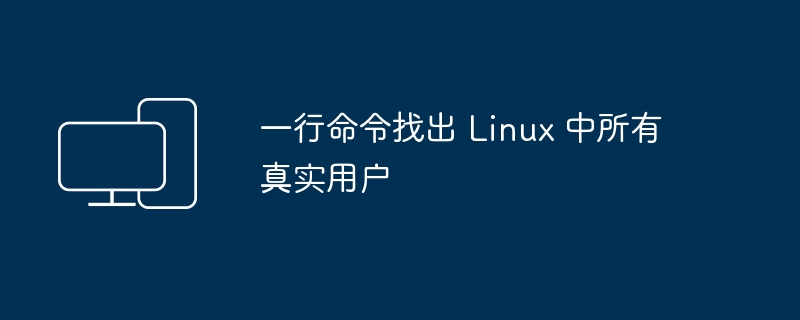One-line command to find all real users in Linux

哈喽大家好,我是咸鱼。
接触过 Linux 的小伙伴们都知道在 Linux (或者说类 Unix)中,有三种类型的用户:
- 超级用户(UID 为 0):即 root 用户,拥有最高权限。
- 系统用户(UID 为 1~999):系统内建用户,用于运行系统服务和守护进程。
- 普通用户(UID 为 1000~60000):为了让使用者能够使用 Linux 系统资源而建立的,用户新建的账号一般就是普通账号。
那么现在问题来了,如何快速找出 Linux 中的真实用户(root 用户和普通用户)?
正式开始之前,我们先介绍一个工具——getent。
getent 命令
getent是"get entries"的缩写,主要用于检索系统数据库中的记录信息,如/etc/passwd、/etc/shadow、/etc/group、/etc/hosts等。它可以根据指定的数据库类型和键来查询特定条目。
(1) 查看本地的主机文件(/etc/hosts)中包含的指定域名信息。
[root@localhost ~]# getent hosts 127.0.0.1 127.0.0.1 localhost localhost.localdomain localhost4 localhost4.localdomain4
(2) 查看本地密码文件(/etc/passwd)中指定用户信息。
[root@localhost ~]# getent passwd user1 user1:x:1000:1000::/home/user1:/bin/bash
(3) 从 /etc/group 数据库中检索指定组信息。
[root@localhost ~]# getent group user1 user1:x:1000:
我们回到问题上来:如何快速找出 Linux 中的真实用户(root 用户和普通用户)?
方法一:
getent passwd | awk -F: '$3 >= 1000 && $3 < 65344 || $3 == 0 {print $1}'(1) getent passwd 用于检索 /etc/passwd 数据库中的所有用户信息
(2) awk 命令:
- -F::指定字段分隔符为冒号 (:)
- $3 >= 1000 && $3 < 65344:表示判断第三个字段(用户 ID)大于或等于 1000 且小于 65344
- $3 == 0:表示判断第三个字段(用户 ID)等于 0
- {print $1}:打印第一个字段(用户名)
总结一下:这条命令将检索 /etc/passwd 数据库中的所有用户信息,并打印出用户 ID 大于或等于 1000 且小于 65344,或者用户 ID 等于 0 的所有用户的用户名。
但是有的小伙伴看到这么一长串的命令就犯难了,”我文本三剑客掌握的不是很好,这条命令尤其是里面的判断看的我头都晕了,还有没有更简单的方法呢?”
方法二:
getent passwd 0 {1000..60000} | awk -F: '{print $1}'- getent passwd 0 {1000..60000} 命令用于检索系统中用户 ID 为 0 以及范围从 1000 到 60000 的所有用户信息
- awk -F: ‘{print $1}:表示对前面输出的内容进行处理——打印第一个字段
这里补充一下:getent passwd 0 {1000..60000} 命令使用花括号扩展 ({1000..60000}) 来生成一个 0 和从 1000 到 60000 的数字序列。
然后,getent passwd 命令使用这些数字作为参数,以检索系统中用户 ID 为 0 和从 1000 到 60000 的用户信息。
The above is the detailed content of One-line command to find all real users in Linux. For more information, please follow other related articles on the PHP Chinese website!

Hot AI Tools

Undresser.AI Undress
AI-powered app for creating realistic nude photos

AI Clothes Remover
Online AI tool for removing clothes from photos.

Undress AI Tool
Undress images for free

Clothoff.io
AI clothes remover

Video Face Swap
Swap faces in any video effortlessly with our completely free AI face swap tool!

Hot Article

Hot Tools

Notepad++7.3.1
Easy-to-use and free code editor

SublimeText3 Chinese version
Chinese version, very easy to use

Zend Studio 13.0.1
Powerful PHP integrated development environment

Dreamweaver CS6
Visual web development tools

SublimeText3 Mac version
God-level code editing software (SublimeText3)

Hot Topics
 1664
1664
 14
14
 1422
1422
 52
52
 1316
1316
 25
25
 1266
1266
 29
29
 1239
1239
 24
24
 Linux Architecture: Unveiling the 5 Basic Components
Apr 20, 2025 am 12:04 AM
Linux Architecture: Unveiling the 5 Basic Components
Apr 20, 2025 am 12:04 AM
The five basic components of the Linux system are: 1. Kernel, 2. System library, 3. System utilities, 4. Graphical user interface, 5. Applications. The kernel manages hardware resources, the system library provides precompiled functions, system utilities are used for system management, the GUI provides visual interaction, and applications use these components to implement functions.
 How to check the warehouse address of git
Apr 17, 2025 pm 01:54 PM
How to check the warehouse address of git
Apr 17, 2025 pm 01:54 PM
To view the Git repository address, perform the following steps: 1. Open the command line and navigate to the repository directory; 2. Run the "git remote -v" command; 3. View the repository name in the output and its corresponding address.
 vscode Previous Next Shortcut Key
Apr 15, 2025 pm 10:51 PM
vscode Previous Next Shortcut Key
Apr 15, 2025 pm 10:51 PM
VS Code One-step/Next step shortcut key usage: One-step (backward): Windows/Linux: Ctrl ←; macOS: Cmd ←Next step (forward): Windows/Linux: Ctrl →; macOS: Cmd →
 How to run java code in notepad
Apr 16, 2025 pm 07:39 PM
How to run java code in notepad
Apr 16, 2025 pm 07:39 PM
Although Notepad cannot run Java code directly, it can be achieved by using other tools: using the command line compiler (javac) to generate a bytecode file (filename.class). Use the Java interpreter (java) to interpret bytecode, execute the code, and output the result.
 What is the main purpose of Linux?
Apr 16, 2025 am 12:19 AM
What is the main purpose of Linux?
Apr 16, 2025 am 12:19 AM
The main uses of Linux include: 1. Server operating system, 2. Embedded system, 3. Desktop operating system, 4. Development and testing environment. Linux excels in these areas, providing stability, security and efficient development tools.
 How to run sublime after writing the code
Apr 16, 2025 am 08:51 AM
How to run sublime after writing the code
Apr 16, 2025 am 08:51 AM
There are six ways to run code in Sublime: through hotkeys, menus, build systems, command lines, set default build systems, and custom build commands, and run individual files/projects by right-clicking on projects/files. The build system availability depends on the installation of Sublime Text.
 laravel installation code
Apr 18, 2025 pm 12:30 PM
laravel installation code
Apr 18, 2025 pm 12:30 PM
To install Laravel, follow these steps in sequence: Install Composer (for macOS/Linux and Windows) Install Laravel Installer Create a new project Start Service Access Application (URL: http://127.0.0.1:8000) Set up the database connection (if required)
 git software installation
Apr 17, 2025 am 11:57 AM
git software installation
Apr 17, 2025 am 11:57 AM
Installing Git software includes the following steps: Download the installation package and run the installation package to verify the installation configuration Git installation Git Bash (Windows only)




